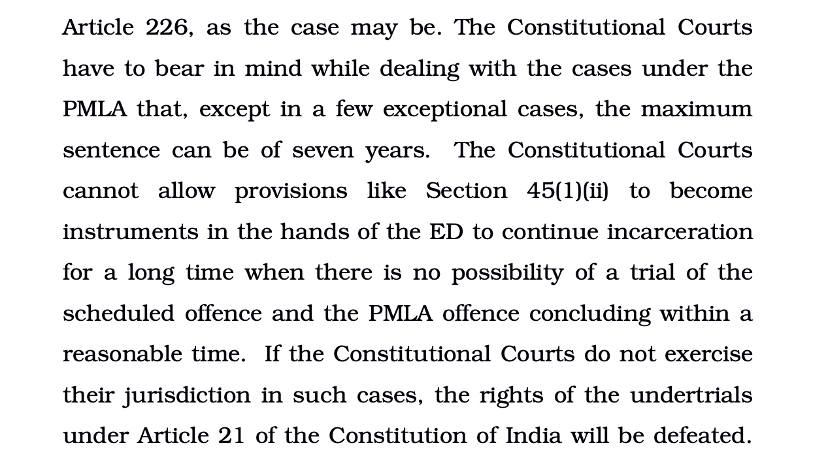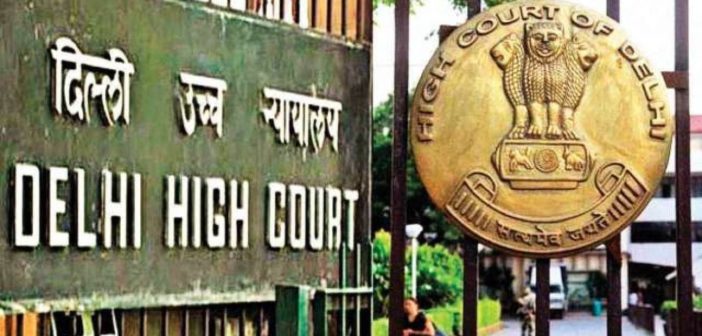In this edition of the Court Judgements review, we look at the Supreme Court’s assertion about the power of the Constitutional Courts to grant bail when fundamental rights are violated, Kerala HC’s ruling that bail conditions cannot be arbitrary and in total oblivion of the purpose of imposing such conditions, Delhi HC’s order that Arbitration Tribunal cannot direct for production of ‘Top Secret’ documents, except in exceptional circumstances, among others.
SC: Stringent bail provisions do not take away the power of the Constitutional Courts to grant bail when the Fundamental Rights are violated
In continuation of its series of verdicts wherein ‘Bail is rule’ is held as the principle in cases such as Manish Sisodia, the Supreme Court (SC) in V. Senthil Balaji (Appellant) vs. The Deputy Director, Directorate of Enforcement (Respondent), has held that though the legislations like Prevention of Money Laundering Act (PMLA) may contain stringent provisions regarding grant of bail to the accused, they do not take the power of the constitutional courts to grant bail if the fundamental rights of the accused are violated.
The facts of the case were the Appellant held the position of Minister of Transport of the Government of Tamil Nadu between 2011 and 2016. The Enforcement and Directorate (ED) arrested him on 14 June 2023 on the complaints received against the allegation that he sold jobs as transport department to several persons, by taking undue advantage of his position as minister. The Appellant’s counsel argued that ED’s claim of illegal deposit of Rs. 1.34 crores in the Appellant’s bank account is obtained by virtue of his agricultural income and the salary by his position as Member of Legislative Assembly (MLA). This was contested by ED and agreed by the court that prima facie there is no material to support the claim that Rs. 1.34 crores of alleged illegal money is obtained through the Appellant’s position as MLA and through Agriculture.
However, the court granted bail to the Appellant on the grounds that the Appellant has already been in prison for more than 15 months, and the trial is not likely to complete in the next 3-4 years, since the number of accused and witnesses to be examined are about 2000 and 600, respectively. This will deprive him of his fundamental right to life under Article 21 of the Constitution of India. Accordingly, the Appellant was granted bail.

Kerala HC: Bail conditions cannot be arbitrary and in total oblivion of the purpose of imposing such conditions
In Sunil Mathew (Petitioner) vs. The Station Office House Officer, the Kerala High Court (HC) held that bail conditions imposed by the courts cannot be in violation of the right of freedom of expression and speech.
The facts of the case were that the Petitioner is the managing director of a YouTube news channel by the name ‘i2i’. In May 2024, K.P. Yohanan, the supreme head of the believers church, was alleged to have died in an accident during his visit to the United States of America (USA). However, the petitioner’s channel had aired news claiming that the reason for K.P. Yohanan’s was not an accident, but because of planned murder. To this effect, the petitioner has also filed a complaint before the Kerala state police. This was contested by another Bishop as false news and an FIR was filed against the Petitioner and the news channel. Fearing arrest, the petitioner filed an anticipatory bail application before the trial court. The bail was granted with the condition that the news channel would not air any content about the death of K.P. Yohanan until his complaint before the police is disposed of. This condition was contested before the HC by the petitioner.
The HC held that freedom of the press is a prerogative which no country can ill afford to renounce. As held by numerous cases by SC, restricting the right to air such views would be counter-productive, though it is subject to reasonable restrictions. Hence, blanket orders restricting the right of a person to express an opinion cannot be issued under the guise of imposing conditions while granting bail. Accordingly, the court set aside the condition of forbidding the petitioner from airing the views/opinions on the death of K.P. Yohanan.

Delhi HC: Arbitration Tribunal cannot direct for production of ‘Top Secret’ documents, except in Exceptional Circumstances
In Director General, Project Varsha, Ministry of Defence (Petitioner) vs. M/s Navayuga-Van OORD JV (Respondent), the Delhi HC held that the Arbitration Tribunal cannot direct the production of top secret documents containing information relating to national security, except in exceptional circumstances.
The facts of the case were that the Petitioner and Respondent entered into an agreement for the execution of Project Varsha in 2017. However, due to several disputes and differences, a notice of termination of the contract was issued by the Petitioner, which eventually led the matter to the Arbitration Tribunal. During the pendency of the proceeding, the respondent filed an application seeking the production of certain documents, with the claim to ascertain the executability of the project within the stipulated timeline. This was objected to by the Petitioner as being a matter of national security and prohibited from disclosure under Official Secrets Act. The Arbitration Tribunal ordered the production of these documents in a sealed cover. It also said that the disclosure to the documents to the Respondent would be considered at a later stage, after hearing both the parties. Aggrieved by the order, the Petitioner approached HC.
The HC held that though the Arbitration Tribunal has the authority to order for production of documents, its scope in matters of national security is very limited and rare. Since Project Varsha is a Navy project on the East Coast of India and has been considered as ‘Top Secret’ project by the Union of India and covered under the Official Secrets Act, the scope becomes even narrower for the judiciary to intervene, except in exceptional circumstances. The present matter does not warrant the same, and the Respondent while entering into the Agreement, has also agreed to abide by the Official Secrets Act. Therefore, the Petitioner was relieved from the production of the sought documents before the Arbitration Tribunal.

Delhi HC: Wife cannot be disentitled to Maintenance merely because she seeks Divorce
In the case of Manish (Petitioner) vs. State of NCT of Delhi & Anr (Respondent), the Petitioner-Husband approached Delhi HC against the order of Family Court which held Respondent-Wife as entitled to maintenance, though she is living separately and seeking Divorce.
The facts of the case were that Husband and Wife were married. Thereafter, for the reasons of physical violence, demands of dowry, and others, the wife left her husband and her matrimonial house to her parents’ house. She also filed an application for maintenance and for Divorce before the Family Court. The husband claimed that the Wife is not entitled to any maintenance as she is living separately without any justifiable reasons and in spite of taking care of her in several ways. In addition, his monthly income is only Rs. 13,000 per month with his parents staying with him to take care of. The wife is also qualified, and able to take care of herself.
The wife submitted that the petitioner and family had sent the Respondent forcefully back to her home on account of not giving the demanded Rs. 1 lakh dowry. Further, the Family Court found her testimony trustworthy on accounts of demand for dowry, assault, and petitioner not financially maintaining her. It also assessed the income of the husband as Rs. 16,000.
The HC held that since the Family Court found the testimony of the wife trustworthy, it does not seek to interfere with it. In addition, there is no material placed on record by the husband to show the financial dependence of his parents on him. Even the claim of the wife being educated is not substantiated by any material. Therefore, merely because the wife is living separately and seeking Divorce with sufficient reasons, does not deprive her of the right to maintenance from her Husband. Accordingly, it upheld the order of the Family to give Rs. 5,500 per month as maintenance with an increase of 10% every two years due to inflation.

Bombay HC: Strikes down amendment made to Rule 3 (1) (V) of IT (Intermediary Guidelines and Digital Media Ethics Code) Rules, 2021 as Unconstitutional
The Central government vide rule 3 (1) (V) Information Technology (Intermediary Guidelines and Digital Media Ethics Code) Rules, 2021 (Rules) made it mandatory for Significant Social Media Intermediaries (SSMIs) to form their own rules and policies to regulate information, which is patently false, untrue and misleading shared on their platforms. Further, vide Amendment dated 6 April 2023, this rule was made applicable to even the information shared about Central government.
The amendment was challenged in Bombay HC by petitioner Kunal Karma on the grounds that it could lead to arbitrary censorship which will result in content being blocked, taken down, or even social media accounts to be suspended or deactivated. A two 2-member bench delivered a split verdict in January 2024, which was referred to a Tie-breaker judge to give his opinion and pass it to the Division bench for final verdict. On 20 September 2024, the tie-breaker judge delivered the verdict and concluded that the 2023 amended Rule of 3 (1) (V) is liable to be struck down for the following conclusions:
- Rule 3(1)(b)(v) of the Rules of 2021 as amended in 2023 is violative of the provisions of Article 14, Article 19(1)(a) and Article 19(1)(g) of the Constitution.
- The said Rule as amended is ultra vires of the IT Act
- The expression “knowingly and intentionally” does not apply to the amended portion of Rule 3(1)(b)(v) in relation to the business of the Central Government.
- The expression “fake or false or misleading” in the absence of it being defined is vague and overbroad.
- The Rule cannot be saved either by reading it down or on the basis of any concession made in that regard of limiting its operation.
- The test of proportionality as laid down in Gujarat Mazdoor Sabha (supra) is not satisfied by the Rule.
- Given the totality of the above, the Rule also results in a chilling effect qua an intermediary
On 26 September 2024, the Division bench of Bombay HC upheld the opinion of the Tie-breaker judgment and struck down the amendment made to Rule 3 (1) (V).



